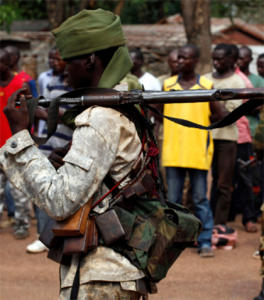The world’s forgotten human catastrophe
It’s the major humanitarian crisis that you may never have heard of.
The nearly ten years of the conflict in the Central African Republic (CAR) has killed at last 6,000 people, and possibly thousands more; it has displaced 700,000 internally and has created almost 300,000 cross-border refugees.
 Violence recently abated in the CAR after armed groups signed a peace deal with the government in 2019.
Violence recently abated in the CAR after armed groups signed a peace deal with the government in 2019.
But a disputed election has triggered a new round of violence and a rebel offensive that threatens to derail the agreement and drag the country – which has some of the highest humanitarian needs per capita of any nation in the world – back into civil war.
The United Nations estimates that in 2021, 2.8 million Central Africans – or 57 per cent of a total population estimated to be 4.9 million – will need humanitarian assistance and protection.
Of those, three-quarters have acute needs. In other words, the survival of 1.9 million people, or 39 per cent of the population, is at risk.
The figures in a UN humanitarian needs report have revealed the dire consequences of the COVID-19 pandemic in a country already ravaged by decades of armed conflict, underdevelopment and where natural disasters are becoming more frequent and severe.
The figures also reveal the grim daily life the majority in the country, who live in such difficult conditions that they are struggling to feed themselves.
“Even those who have enough food find it difficult to find decent housing or to get their children an education. The data also shows that there is a danger of humanitarian actors disengaging when development actors are slow to take over,” the report said.
“The Central African Republic continues to face a serious protection crisis, with a steady increase in violations of human rights and international humanitarian law despite the signing of the Political Agreement for Peace and Reconciliation in 2019,” it said.
“Those who suffer most are not those fighting, but rather the civilians. One in four Central Africans are displaced either within the country or in a neighbouring country, and the return of internally displaced people and refugees has slowed down considerably,” the report said.
It said gender-based violence was in plague proportions, with one incident reported every hour by the humanitarian alert system, which covers only 42 per cent of the country.
Aid agencies have recorded a doubling in the number of cases of violence against girls and women as a result of restrictions related to COVID-19.
They say across the Central African Republic, children continue to be exposed to risks. One in four families fears for the safety of its children, mainly in relation to sexual violence, forced labour and recruitment by armed groups.
The CAR is also one of the most dangerous countries for humanitarian workers in the world, the report said.
“On average, more than one incident per day affecting humanitarian workers was recorded between January and the end of September 2020, with two aid workers killed and 21 injured,” it said.
The report says the current Humanitarian Response Plan is funded at just over half of the US$553.6 million needed.
More than 100,000 people have fled their homes since the December election that saw President Faustin-Archange Touadera win another five year term of government.
Some of CAR’s largest rebel groups claim the election was fraudulent and have formed a coalition to oust the 63-year-old.
Major towns have already fallen to the group, which has also launched attacks on the outskirts of the capital Bangui. The rebels are supported by CAR’s former president, Francois Bozize, whose ousting in 2013 saw the country descend into years of civil war.












